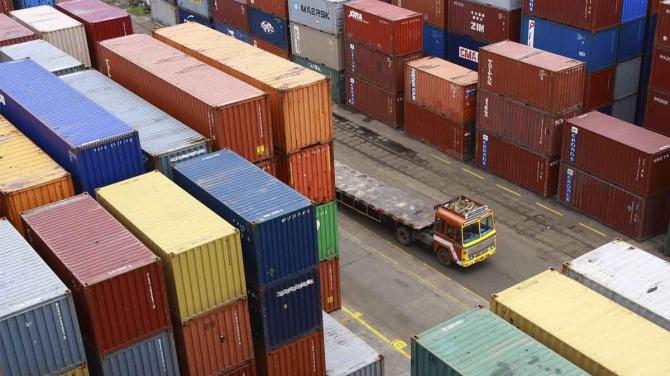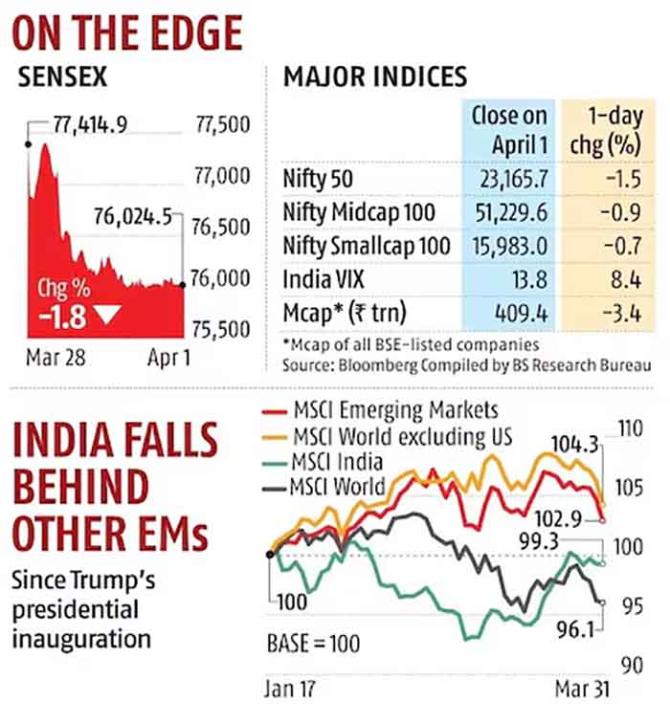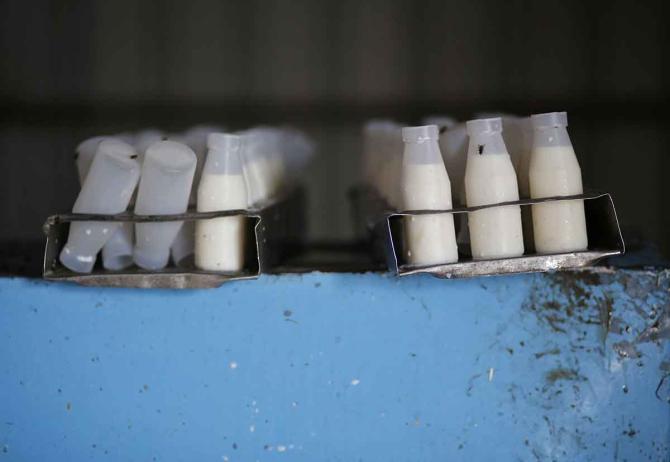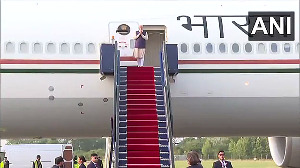The US Trade Representative noted that India's average applied tariff rate stood at 17% per cent, the highest of any major world economy.

Kindly note the image has been posted only for representational purposes.
IMAGE: A truck passes shipping containers stacked at the container terminal at Cochin Port on Willingdon Island in Kerala. Photograph: Sivaram V/Reuters
Ahead of the imposition of reciprocal tariffs on April 2, the United States has raised concerns over India's high import tariffs in key sectors, such as automobiles, agricultural goods, medicines, and alcohol.
It also flagged what it described as 'sudden' tariff changes and regulatory hurdles that act as non-tariff barriers to American exports.
The National Trade Estimate report on Foreign Trade Barriers, released by the US Trade Representative (USTR), noted that India's average applied tariff rate stood at 17 per cent in 2023 (down from 18.1 per cent in 2022), 'the highest of any major world economy'.
The average import tariff for non-agricultural goods was 13.5 per cent, while agricultural goods faced an average of 39 per cent.
Following Customs Duty cuts in the FY26 Budget, Central Board of Indirect Taxes and Customs (CBIC) Chairman Sanjay Kumar Agarwal had said in an interview with Business Standard that India's average tariff has now dropped to 10.66 per cent from 11.65 per cent, bringing it closer to the Association of Southeast Asian Nations' average.
'India maintains high applied tariffs on a wide range of goods, including vegetable oils (as high as 45 per cent); apples, corn, and motorcycles (50 per cent); automobiles and flowers (60 per cent); natural rubber (70 per cent); coffee, raisins, and walnuts (100 per cent); and alcoholic beverages (150 per cent),' stated the USTR report.
The report also underscored India's high basic Customs duties on drug formulations, including life-saving medicines listed on the World Health Organization's essential medicines list.
It stated that high tariff rates also restrict trade in agricultural goods and processed foods, such as poultry, potatoes, citrus fruits, almonds, pecans, apples, grapes, canned peaches, chocolate, biscuits, frozen French fries, and other prepared foods used in fast-food restaurants.
The USTR argued that India's significant gap between its bound and applied tariff rates under the World Trade Organization allows it to change rates for both agricultural and non-agricultural products at any time, creating what it called 'tremendous uncertainty' for US workers, farmers, ranchers, and exporters.
On Sunday, US President Donald Trump said the reciprocal tariffs would apply to 'all countries' without exception, dashing hopes in India for an exemption amid ongoing negotiations on tariff concessions under the proposed bilateral trade agreement (BTA).
A day earlier, Trump described India's tariffs as 'brutal' but maintained that trade relations between the two nations would 'work out very well'.
While releasing the report, USTR Jamieson Greer said: 'No American President in modern history has recognised the wide-ranging and harmful foreign trade barriers (that) American exporters face more than President Trump.
'Under his leadership, this administration is working diligently to address these unfair and non-reciprocal practices, helping restore fairness and put hardworking American businesses and workers first in the global market.'
The annual report, which underscores Trump's 'America First Trade Policy', lists nearly 60 countries whose policies and regulations it considers to be trade barriers.
Though the broad concerns over India's trade and non-tariff barriers remain similar to those outlined in the 2024 USTR report under the Joe Biden administration, the latest assessment aligns more closely with Trump's push for reciprocal trade policies.
On Monday, White House Press Secretary Karoline Leavitt pointed to high tariff rates imposed by the European Union, Japan, India and Canada, suggesting that these countries would be among the primary targets of the reciprocal tariffs.
For the first time, the USTR report flagged concerns over the draft rules of India's Digital Personal Data Protection Act (DPDPA), warning that they could impose 'burdensome requirements' on data fiduciaries and mandate the disclosure of personal data to the Indian government.
The report noted that the draft rules allow the Indian government to restrict cross-border data transfers to specific countries through formal notifications.
India's data privacy law may also introduce sector-specific data localisation requirements.

The USTR acknowledged that India had made 'progress' by raising the foreign direct investment (FDI) cap on the insurance sector from 74 per cent to 100 per cent.
However, it pointed out that India has yet to clarify whether it will remove safeguards that require a majority of board members to be Indian residents.
Besides, if an insurer is incorporated or domiciled outside of India, the current safeguards mandate them to maintain a higher solvency requirement for foreign-invested insurers.
Experts argue that while India's tariffs are high, they remain compatible with global trade norms.
Ajay Srivastava, a former trade ministry official and founder of the think-tank Global Trade Research Initiative, said the US continues to pressure India to alter its trade policies to serve American commercial interests.
However, he emphasised that India must assess each demand through the lens of its own national priorities, development goals, and cultural values.
"Many of the proposed changes -- in areas like agriculture, digital governance, and public health -- pose serious risks to India's ability to protect its small farmers, maintain food safety, uphold deeply rooted social norms, and secure its digital future.
"India is not opposed to reform or global cooperation, but any engagement must be fair, reciprocal, and respectful of sovereignty," he said.
What's new in 2025 report
Key trade and non-tariff barriers flagged by the US regarding India
- High import duties on automobiles, agricultural goods, medicines, and alcohol
- Proposed data privacy rules may impose burdensome requirements on data fiduciaries, and mandate personal data disclosures to the Indian government
- Insurance FDI cap raised to 100%, but there is no clarity over potential removal of certain 'safeguards'
- Laptop import monitoring system in focus, and the US is engaging with India on this matter
- Dairy import restrictions and high tariffs limit the US' market access for milk , dairy products
USTR Flags Unclear Safeguards in 100% FDI Move for Insurance
Subrata Panda, Ajinkya Kawale

Kindly note the image has been posted only for representational purposes. Photograph: Kind courtesy kalhh/Pixabay.com
While India has announced raising the cap on foreign direct investment (FDI) in insurance from 74 per cent to 100 per cent, it remains unclear whether certain safeguards for domestic firms introduced in 2021 will be removed, says the USTR report.
These safeguards include requirements such as resident Indians comprising a majority of the members of a board, and higher solvency for insurers domiciled outside India.
'According to India's 2025 Union Budget, India will raise its FDI cap on the insurance sector from 74 per cent to 100 per cent.
'While this represents progress, it still is not clear if India will remove safeguards instituted in 2021,' the USTR report said.
According to reports, the government is reviewing and simplifying rules to increase the FDI limit in the insurance sector to 100 per cent.
Meanwhile, the report has highlighted that India maintains an uneven playing field in insurance.
The USTR report had raised the same concerns.
'State-owned companies are not subject to the same law and prudential supervision as private firms and enjoy various guarantees from the government.
'Currently, the Indian Government maintains an explicit sovereign guarantee on every Life Insurance Corporation (LIC) policy.
'As a result, many customers choose to buy LIC policies over those offered by private insurers, giving LIC an unfair competitive advantage,' the report said.
Additionally, the report says Indian regulations give the country's reinsurers a mandatory first order of preference (or right of first refusal) in the reinsurance business.
'This results in unequal treatment for foreign reinsurers and consolidates risk in a small number of Indian reinsurers, which is counter to global best practices of global diversification of risk,' the report said.
In India, state-owned GIC Re is the only domestic reinsurer, which has been in the business since 1972.
After liberalisation in the insurance industry in 2001, GIC Re was designated 'national reinsurer' and has the advantage of the first right to refusal and obligatory cession.
Currently, there are also 13 foreign reinsurance branches (FRBs), set up by global reinsurance companies, including Munich Re, Swiss Re, and Lloyd's, operating in India.
Separately, the USTR report reiterates that under India's branch authorisation policy, foreign banks are required to submit their internal branch expansion plans annually, and their ability to expand is hindered in a non-transparent manner.
In January, HSBC India, the local arm of London-headquartered HSBC, received approval from the Reserve Bank of India to open 20 branches, one each in 20 cities.
The report also says banking in India is dominated by State-owned banks, which account for approximately 60 per cent of market share and 67 per cent of the branches in the country.
Most privately owned banks are Indian-owned, with foreign banks constituting less than 0.6 per cent of the bank branches in India.
Additionally, the report reiterated concerns over the 30 per cent market cap on players offering India's real-time payments services on Unified Payments Interface (UPI). The concerns were previously mentioned in a USTR report in 2024.
It said that foreign digital payment companies were given until January 2023 to ensure their market shares met the 30 percent limit, but the ministry of finance has not enforced this market share ceiling.
However, the timeline to enforce the market cap has been pushed by another two years for the second consecutive time to the end of 2026.
'The United States also has expressed concern over plans to expand the adoption of a National Common Mobility Card (NCMC) that only uses a domestic proprietary QR code standard, which disadvantages foreign suppliers,' it said.
US Criticises India's High Farm Tariffs, Pushes for Dairy Market Access
Sanjeeb Mukherjee

Kindly note the image has been posted only for representational purposes.
IMAGE: Bottles filled with milk samples are pictured inside a milk chilling centre. Photograph: Anindito Mukherjee/Reuters
The US has once again slammed India for high tariffs on agricultural products and non-tariff restrictions to market access and has sought greater access to India's dairy market for its products.
In the latest annual report on foreign trade barriers, the USTR said that India maintains high tariffs on a wide range of goods that include vegetable oils (45 per cent); apples, corn, and motorcycles (50 per cent); automobiles and flowers (60 per cent); natural rubber (70 per cent); coffee, raisins, and walnuts (100 per cent); and alcoholic beverages (150 per cent).
'High tariff rates also present a significant barrier to trade in other agricultural goods and processed foods (for example, poultry, potatoes, citrus, almonds, pecans, apples, grapes, canned peaches, chocolate, cookies, frozen french fries, and other prepared foods used in fast-food restaurants),' the USTR report said.
It added that India's World Trade Organization (WTO) bound tariff rates on agricultural products are among the highest in the world, averaging 113.1 per cent and ranging as high as 300 per cent.
The USTR's concerns are almost the same as they were in the last report tabled in 2024 except for the fact that trade negotiations between India and the US have reached a critical stage and the threat of reciprocal tariffs looming large has further underscored the criticality of the findings.
The USTR report said that given the large disparity between the WTO bound and applied rates, India has considerable flexibility to change tariff rates for both agricultural and non-agricultural products at any time, creating tremendous uncertainty for US workers, farmers, ranchers, and exporters.
The report also raised concerns about India's biotechnology approval process that hinders the registration of genetically-engineered (GE) products in the Indian market.
'India's biotechnology approval processes are slow, opaque, and subject to political influences and do not appear to take into account science-based approval processes for GE products in exporting countries,' the report said.
It also said that though India has set an ambitious target of blending petrol with ethanol, it continues to prohibit importing ethanol for use as fuel.
The report further said that on the critical issue of allowing import of dairy products into India, the US government has continued to press India to provide greater access to the dairy market for US products.
Feature Presentation: Ashish Narsale/Rediff.com
















